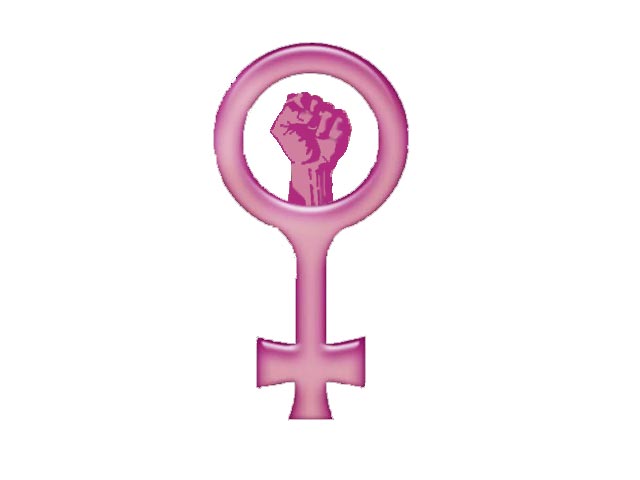
St Joseph’s College for Women’s principal Dr Bernadette Dean, senior journalist Zubeida Mustafa, Aurat Foundation’s director Mahnaz Rahman and National Commission for the Status of Women’s former chairperson Anees Haroon were present at Shaheed Zulfikar Ali Bhutto Institute of Science and Technology (Szabist) to speak about ‘Women in a changing society’.
“Thousands of girls in our country will never see the inside of a classroom,” said Dr Dean. “There is a very high dropout rate of women in schools and colleges because they are systematically ‘educated’ into believing that a woman’s role is in the home.”
Dean went on to speak about the increasing awareness among women of men and masculinity being promoted unfairly in our society.
“I am told time and again that ‘he’ encapsulates ‘she’ in text books and in everyday use of language, but that is simply not true,” she said, adding that every ‘she’ has its own identity and should be recognised as such.
“In textbooks, men are shown as being invincible, just because they are men,” she pointed out. “They are shown without relationships with their wives and children except as breadwinners of the family. Then where do these children come from?” she asked.
Dean added that textbooks depict the old reality and deny the new one. “They fail to acknowledge the rising number of women entering the public sphere. We need to be able to imagine new realities in order to see them come true.”
Women through the ages
Rahman took a trip down memory lane when she spoke about the relative independence offered to women since 1947. “When we were in school about 60-plus years ago, people had a modern outlook on life,” she said. “We wanted Pakistan to follow in the footsteps of the Western world and educated men wanted to take their women along with them.”

She recalled that women went as far as presenting a charter of their rights to the government in late October, 1955.
“Our generation also saw and tolerated the first martial law. Every martial law pushed us behind and every dictator was bad for women,” she believed. “Under Ziaul Haq, it seemed as if history had begun to move in reverse.”
Rahman recalled how women’s clothes became a point of debate under that regime. “Irrational values, such as forcing women to have their dupatta on their heads at all times, became the norm.”
She felt allowing democratic governments to complete their terms would be instrumental in improving the status of women.
Mustafa, one of the first female journalists in Pakistan who joined Dawn as an assistant editor in 1975, spoke about Pakistan going through a state of transition on a number of fronts, including women’s rights.
“Maintaining traditions is easy. Going against them is difficult,” she said. “There will be fluctuations. We will find ourselves moving forward and then backward on women’s rights just like on every other area of development.”
She added that Pakistanis must be very clear in their heads about what we want. “And that is an equal Pakistan.”
“We cannot educate a woman and then prevent her from working or from choosing who she wants to marry.”
According to Mustafa, one of the reasons why women in developing countries didn’t get their rights was because of poor health and nutrition. “Even today, men eat first in some households and women eat whatever is left.”
Published in The Express Tribune, April 3rd, 2013.
COMMENTS (10)
Comments are moderated and generally will be posted if they are on-topic and not abusive.
For more information, please see our Comments FAQ

1731916090-0/sabrina-(3)1731916090-0-165x106.webp)


1732020599-0/BeFunky-collage-(73)1732020599-0-165x106.webp)












Strange how every time a religious revolution comes about, the starting point is a statement on women's clothing.
@Stranger: Well from what I have seen among my friends who had to leave jobs to take care of kids..... they often expressed dissatisfaction primarily because they felt an intellectual stagnation. And few of them could not wait for kids to grow up to a certain age when these women decided to get back in workforce.
Taking care of kids is a very demanding job yet application of your mind to contribute at work gives a lot of mental satisfaction. Secondly working also gives opportunity to interact, learn from and associate with variety of people from diverse backgrounds, and that itself broadens the outlook and keeps one mentally agile to some extent. Finally, however we may see it but financial independence is very important in today's world and it helps a woman feel more capable to deal with ups and downs of life.
Women should be respected. Women should be treated well. Women should be educated. When they are to bear children, they should have freedom from dependence on having to make money, as men should provide for them and the offspring. Women should have facility to raise their children without having to bear the burden of a bread earner; nor should children be deprived of the care of their mother while being raised. During all these periods, men should provide for women. All men should be responsible for providing all the necessary resources for raising their daughters and for their education. All men, should support their sisters in getting education. All men should be primarily responsible for the sustenance of their other significants. Women should have freedom to work, when men alone cannot suffice for their family needs but they should not have to do undignified work. While studying women should have learnt enough to be able to work honorably to supplement the family's income, if and when necessary. The best of men are the ones that treat their wives with dignity, honor, and respect. And, the best of men are those that treat their daughters as a "trust" that has to be developed for coping with the challenges of life. The best of men also treat their sisters with due respect and support them in their needs. The best of men are always willing to help ladies in a dignified way.
Err @Arsha more than working woman I would like to say Educated Women. Many working women go around their lives totoally cucooned . Many stay-at-home educated women are aware of their happenings around. Yes educated and working women are confident definitly . We need to be wary that this does not become over confi or arrogance.
@Stranger: Yes there is responsibility but there is limited scope for development of individuality, for being self dependent and self sufficient, for working towards expanding your intellectual curiosity, knowledge and intellectual contribution which in turn contributes to high self esteem. And that makes women vulnerable to oppression.
There is usually notable difference in level of confidence, awareness and social skills of a working woman versus someone who has always been a homemaker. There is also a difference in the sense of self, and aspirations towards personal achievements.
This is my personal observation of women I have come across in daily life.
Hey whats wrong with domesticity. Its not easy being a (house) wife and a stay at home mum. It comes with responsibility. Please stop talking as it being a domesticated person means being backward.
Despite the fact that women are systematically educated into believing their place is at home, an overwhelmingly female audience gathered to listen to four women talk on Tuesday.
A woman's place is at home.Nothing wrong with that.
Enough of this feminist brainwashing. Alhamdulliah,as long as their are religious seminaries and institutions that teach Muslim women their actual role.These feminists will have little to no effect on the society as whole. Feminist rhetoric is based on failed principles and morals. It has no place in an Islamic society.
welcome to women empowerment under Islam.
In Pakistan, women are quite weak as they don't have say in the society.
Though both men and women share equally, but in case of working women their share is more than of men.
The male dominant society has made the women weak.
Women can only get their rights when NGO's work on men to give equal rights to the women.
I want women in Pakistan to stand up and organize an open debate in all the major cities as how they have been treated by the men and educate them to give equal status and rights to the women.
It is unfortunate that women in Pakistan are more literate then men, although men have more exposure than women.
Women bring positive change in politics and society if allowed to contribute. Empirical evidence shows that when more women are in parliament, attention turns towards health and education sectors as women personally have to deal with it while raising kids. When women reach the top of the ladder they are less affected by flesh and other temptations and thus allows them to stick to their objectives. It is no secret that women in Pakistan are treated very badly. Some never even come out of their homes. This is certainly not the Pakistan which is portrayed in the videos of national songs which shows women singing and dancing. My message to Pakistanis is to say no to talibanization and say no to age old customs. Lets join the modern world.